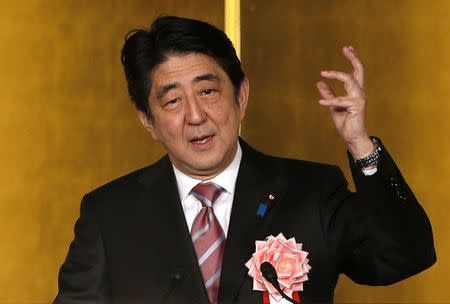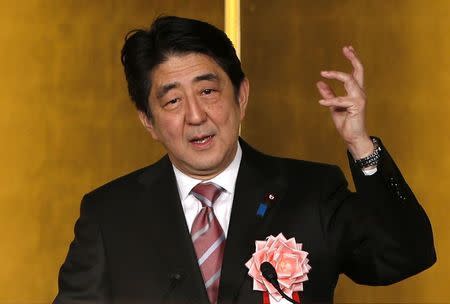Japan proposes record $42 billion military budget to counter China's rise
TOKYO (Reuters) - Japanese Prime Minister Shinzo Abe's government approved a record $42 billion (28 billion pound) military budget on Wednesday, with outlays rising for a third year to counter China's rising military might.
The draft budget for the fiscal year from April includes a 2.8 percent rise in defence spending to 4.98 trillion yen, for items such as planes, naval vessels and fighting vehicles to guard waters bordering China, which has a long-running dispute with Tokyo over Japanese-held islands in the East China Sea.
"The situation around Japan is changing," Defence Minister Gen Nakatani said on Sunday. "The level of defence spending reflects the amount necessary to protect Japan's air, sea and land, and guard the lives and property of our citizens."
Abe has reversed a decade of military spending cuts as he seeks a more robust posture for the long-pacifist government, although his modest increases are dwarfed by China's double-digit rises in defence spending.
Beijing said last March it was raising annual defence spending by 12 percent to $130 billion.
China's foreign ministry said Japan's proposal to increase military spending sent a signal about its willingness to help "foster peace and stability in the region".
"Japanese government policies in the field of military safety have always received the close attention if its Asian neighbouring countries and the international community because they are a weather vane of whether Japan is willing to walk the path of peaceful development," said ministry spokesman Hong Lei at a daily briefing.
Japan's new outlays will help pay for troop-carrying Boeing Co Osprey tilt-rotor aircraft, Northrop Grumman Corp Global Hawk surveillance drones, Lockheed Martin Corp F-35 stealth fighters, and Kawasaki Heavy Industries Ltd's P-1 submarine hunting planes and stealthy Soryu submarine.
The budget also includes spending to relocate U.S. troops away from Okinawa island, where locals have protested a heavy American presence.
(Reporting by Tim Kelly and Nobuhiro Kubo, additional reporting by Natalie Thomas in BEIJING; Editing by William Mallard and Jeremy Laurence)





